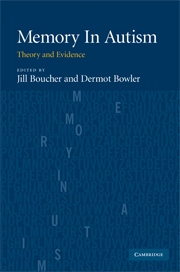1 - Concepts and theories of memory
Published online by Cambridge University Press: 05 November 2009
Summary
Concept. A thought, idea; disposition, frame of mind; imagination, fancy; …. an idea of a class of objects.
Theory. A scheme or system of ideas or statements held as an explanation or account of a group of facts or phenomena; a hypothesis that has been confirmed or established by observation or experiment, and is propounded or accepted as accounting for the known facts; a statement of what are known to be the general laws, principles, or causes of something known or observed.
From definitions given in the Oxford English DictionaryThe Oxford Handbook of Memory, edited by Endel Tulving and Fergus Craik, was published in the year 2000. It is the first such book to be devoted to the science of memory. It is perhaps the single most authoritative and exhaustive guide as to those concepts and theories of memory that are currently regarded as being most vital. It is instructive, with that in mind, to browse the exceptionally comprehensive subject index of this handbook for the most commonly used terms. Excluding those that name phenomena, patient groups, parts of the brain, or commonly used experimental procedures, by far the most commonly used terms are encoding and retrieval processes. Terms for different kinds of memory also feature prominently, as one would expect. Among the most frequently used are short-term and long-term memory; explicit and implicit memory; working memory; episodic and semantic memory; verbal, visual and procedural memory.
- Type
- Chapter
- Information
- Memory In AutismTheory and Evidence, pp. 3 - 20Publisher: Cambridge University PressPrint publication year: 2008
- 4
- Cited by



